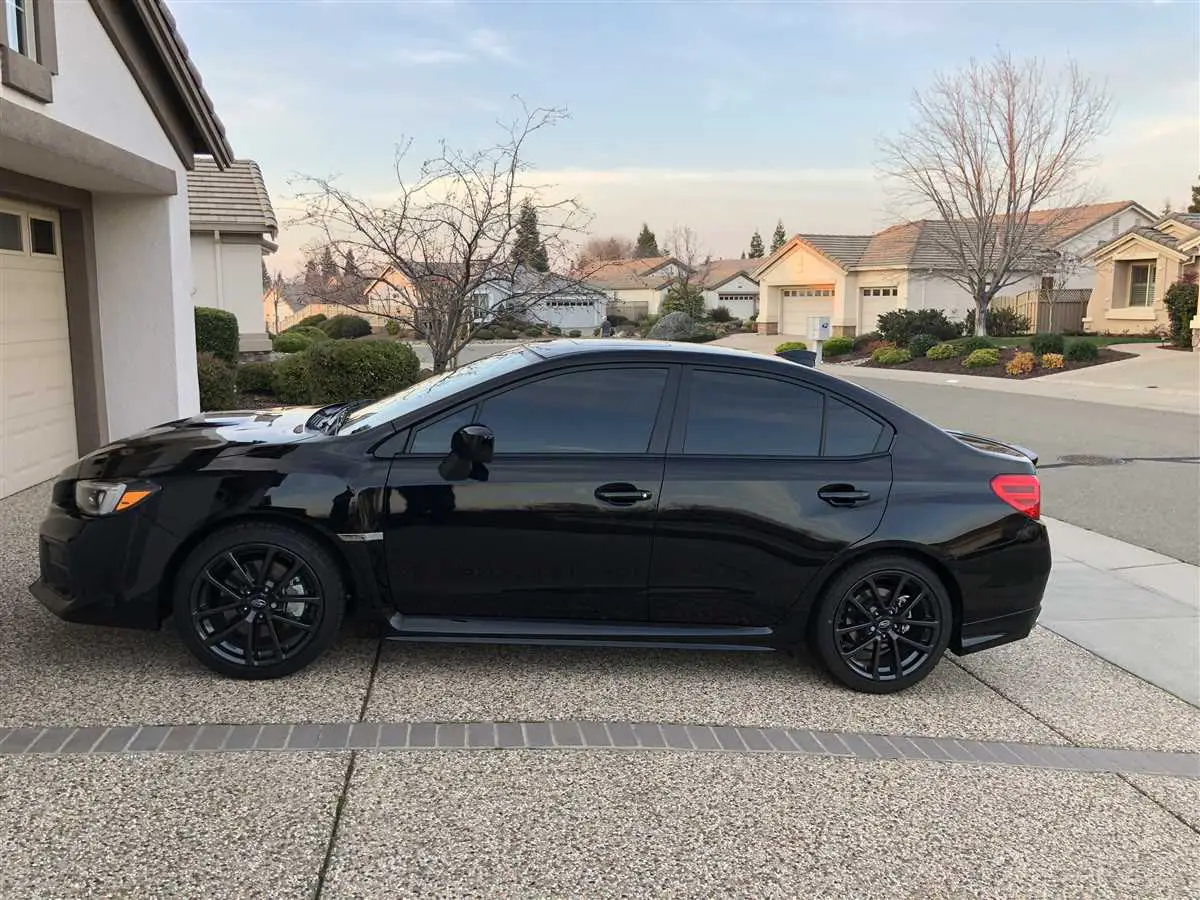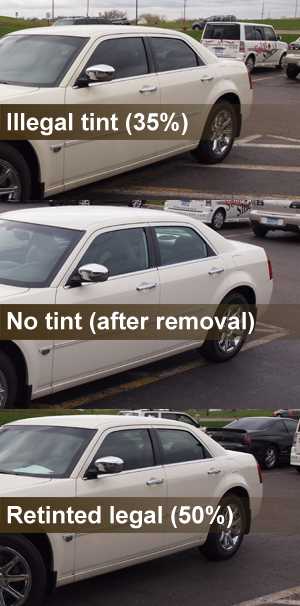Last Updated on February 26, 2024 by Vadym

Tinted windows have become a popular choice for many vehicle owners these days. Not only do they enhance the overall appearance of a car, but they also provide some practical benefits, such as reducing glare and preserving privacy. However, there are regulations in place regarding the darkness of window tints, and it’s essential to know the legal limits before getting your windows tinted.
In most jurisdictions, there are specific laws regarding the tint darkness on vehicle windows. These laws are in place to ensure the safety of both drivers and law enforcement officers. The level of tint darkness that is allowed can vary from one location to another, so it’s crucial to familiarize yourself with the specific rules in your area.
Violating tint darkness regulations can result in citations and fines. In some cases, excessive tint darkness may even lead to the impoundment of the vehicle until the issue is resolved. It’s important to note that law enforcement officers have tools to measure the darkness of window tints, and if yours exceeds the legal limit, you may be subject to penalties.
So, before you decide to get your car windows tinted, take the time to research the regulations in your area. Make sure to choose a reputable installer who understands and follows these regulations to avoid any potential legal issues. Remember, while tinted windows can be a great addition to your vehicle, it’s essential to stay within the legal limits to enjoy their benefits without any consequences.
Understanding Tinted Windows and the Law
Tinted windows are a popular choice for car owners looking to add style, privacy, and protection to their vehicles. However, it’s important to understand the laws and regulations surrounding tinted windows to avoid any potential legal issues and fines.
The laws regarding tinted windows vary from state to state and country to country. The level of tint allowed and the percentage of visible light transmission (VLT) that is permitted can differ significantly. It’s crucial to familiarize yourself with the specific laws in your area to ensure compliance.
In many states, law enforcement officers have the authority to pull over vehicles with excessively tinted windows to check for compliance. They may use a special device called a tint meter to measure the VLT and determine if it falls within the legal limit.
Exceeding the legal limit for tinted windows can result in fines and other penalties. These penalties may vary depending on the jurisdiction and the severity of the violation. In some cases, you may be required to remove the illegal tint and pass an inspection before you can drive your vehicle legally again.
It’s worth noting that there are exceptions to tint laws for certain medical conditions or auto-related issues. These exceptions typically require a permit or documentation from a medical professional.
To avoid any potential issues, consider consulting with a reputable window tinting professional who is knowledgeable about the local laws and regulations. They can help you select the appropriate level of tint that complies with the law while still meeting your needs and preferences.
In conclusion, understanding the laws and regulations surrounding tinted windows is essential to avoid legal trouble. Do your research, know the limits, and make sure to comply with the laws in your area. By doing so, you can enjoy the benefits of tinted windows while staying on the right side of the law.
Knowing the regulations and restrictions
Before you tint your car windows, it’s essential to familiarize yourself with the regulations and restrictions in your area. These rules can vary significantly from one jurisdiction to another, so what might be legal in one place could lead to a ticket in another. By understanding the laws, you can ensure that your tinted windows comply with local regulations and avoid any potential fines or penalties.
One of the primary factors to consider when it comes to window tinting regulations is the Visible Light Transmission (VLT) percentage. This refers to the amount of light that must be able to pass through the tinted windows. The lower the VLT percentage, the darker the tint can be. Many jurisdictions have specific limits on the VLT percentage for different windows of the vehicle, such as the front windshield, front side windows, and rear windows. Make sure you understand these limits and choose a tint that falls within the acceptable range.
Furthermore, some areas have restrictions on the type of tint that can be used. For example, reflective or mirrored tints may be prohibited due to their potential to distract other drivers. Additionally, certain jurisdictions may require manufacturer certification labels to be affixed to the tinted windows, indicating that they meet the appropriate standards. Check your local regulations to ensure that you comply with any specific requirements.
It’s also crucial to be aware of the potential consequences of non-compliance with window tinting laws. If you are pulled over by law enforcement and your windows are found to be tinted illegally, you may receive a ticket, resulting in a fine. The amount of the fine can vary depending on the jurisdiction and the severity of the violation, but it is typically an avoidable expense if you follow the rules.
| Window | VLT Limit |
|---|---|
| Front windshield | Varies |
| Front side windows | Varies |
| Rear windows | Varies |
Remember, window tinting laws exist to ensure the safety of all drivers on the road. By knowing and adhering to these regulations, you can enjoy the benefits of tinted windows without the risk of receiving a ticket or being pulled over.
Types of tinted windows and their legality
There are several types of tinted windows that people commonly use on their vehicles. Each type of tint has its own level of darkness and UV protection. Here are some of the most common types:
1. Factory tinted windows: Some cars come with factory tinted windows, which means that the windows are already tinted when the car is purchased. The level of tint can vary depending on the manufacturer and model of the car. Generally, the front windows have a lighter tint compared to the rear windows, which are usually darker. Factory tinted windows are usually legal and comply with the local tint laws.
2. Film tint: Film tint is a type of tint that is applied to the windows after the car has been purchased. It comes in various levels of darkness and is usually made of polyester or a combination of polyester and metal. Film tint is the most common type of tint used by car owners. However, it is important to ensure that the level of darkness complies with the local tint laws to avoid getting a ticket.
3. Ceramic tint: Ceramic tint is a high-end type of tint that provides excellent heat rejection and UV protection. It is made of ceramic nanoparticles and typically comes in lighter shades. Ceramic tint is more expensive compared to other types of tint, but it is usually legal and complies with the local tint laws.
4. Colored tint: Colored tint is a type of tint that comes in various colors, such as blue, green, or red. It is mainly used for aesthetic purposes rather than for UV protection or heat rejection. Colored tint is not legal in many jurisdictions, so it is important to check the local tint laws before installing colored tint on your windows.
5. Reflective tint: Reflective tint is a type of tint that has a reflective surface on the outside, which helps to reduce heat and glare. It is commonly used in hotter climates to keep the car cool. However, reflective tint is not legal in many jurisdictions, so it is important to check the local tint laws before installing reflective tint on your windows.
It is important to remember that the legality of tinted windows can vary from one jurisdiction to another. It is recommended to check the local tint laws before installing any type of tint on your vehicle. Violating the tint laws can result in a ticket and additional fines.
Enforcement and penalties for illegal tinting

Law enforcement agencies are responsible for enforcing regulations regarding window tinting. Officers are trained to identify illegal window tint during routine traffic stops or inspections. They use special tools, such as tint meters, to measure the amount of light that passes through the window.
If a driver is found to have illegally tinted windows, they may be issued a traffic ticket or citation. The specific penalties for illegal tinting vary depending on the jurisdiction, but common consequences include fines, points on the driver’s license, and mandatory removal of the tint film.
In some cases, drivers may be required to bring their vehicle to a designated inspection station for a thorough examination of the tinted windows. If the windows are deemed to be too dark, the driver will be required to have the film removed or face further penalties.
Repeat offenders can face more severe penalties, including higher fines, license suspension, or even vehicle impoundment. Additionally, some jurisdictions have laws that allow officers to issue citations for windows that are excessively reflective, as this can also impair visibility.
It’s important to note that laws regarding window tinting vary by state, so it’s essential for drivers to familiarize themselves with the regulations in their specific jurisdiction. Some states may have stricter regulations, while others may have more lenient rules.
To avoid penalties for illegal tinting, drivers should consult their local department of motor vehicles or law enforcement agency for accurate information on the allowed levels of window tint. It’s also recommended to have tint installed professionally, as it’s more likely to comply with the laws and regulations in place.
How to maintain legal tinted windows
Having tinted windows on your vehicle can provide a number of benefits, such as reducing glare, protecting your interior from harmful UV rays, and increasing privacy. However, it’s important to ensure that your tinted windows comply with local laws and regulations to avoid getting a ticket.
To maintain legal tinted windows, consider the following:
Check local laws and regulations:
Before getting your vehicle windows tinted, familiarize yourself with the laws and regulations in your area. Different states and countries have different rules regarding the maximum allowable tint percentage, as well as restrictions on which windows can be tinted.
Choose a reputable tint shop:
When selecting a tint shop to install your window tint, make sure to choose a reputable one that is knowledgeable about local laws and regulations. They should be able to advise you on the best tint options that meet legal requirements.
Opt for a lighter shade:
Choosing a lighter shade of window tint can reduce the likelihood of attracting attention from law enforcement. Darker tints are more likely to be scrutinized, so it’s best to stay within the legal limits to avoid issues.
Avoid altercations with law enforcement:
It’s important to always drive responsibly and follow traffic laws. An altercation with law enforcement for other reasons can lead to them inspecting your vehicle and potentially issuing a ticket for tinted windows that do not comply with regulations.
Maintain your window tint:
Regularly inspect your window tint for any signs of damage or deterioration, such as bubbling or peeling. If you notice any issues, have your tint repaired or replaced as necessary to ensure it remains within legal limits.
Remember that the information provided in this article is general in nature and should not be taken as legal advice. Be sure to consult with local authorities or legal professionals for specific guidance regarding tinted windows in your area.
Benefits of having legal tinted windows
Tinted windows are a popular aftermarket modification for cars, and there are several benefits to having them installed. However, it is important to note that having illegal tinted windows can result in a ticket or fine, so it is essential to follow the laws and regulations of your jurisdiction. Here are some of the advantages of having legal tinted windows:
1. Protection from sunlight: Legal window tints can significantly reduce the amount of sunlight that enters the car. This can help to keep the interior of the vehicle cooler on hot days, making it more comfortable for both the driver and passengers. It also helps to protect the upholstery, dashboard, and other interior components from fading or cracking due to sun exposure.
2. Privacy and security: Tinted windows can provide an extra layer of privacy, preventing prying eyes from seeing the inside of your car. This can be particularly beneficial if you often leave valuable items in your vehicle. By obstructing the view from the outside, tinted windows reduce the risk of theft or break-ins.
3. Glare reduction: Tinted windows can help to reduce glare from the sun, headlights, or other bright lights. This can greatly enhance visibility and reduce eye strain, making your driving experience safer and more comfortable.
4. UV protection: Legal window tints are designed to block a significant amount of ultraviolet (UV) rays from entering the car. UV rays can be harmful and can cause skin damage and increase the risks of skin cancer. Having tinted windows can help to protect you and your passengers from these harmful rays.
5. Improved energy efficiency: By reducing the amount of sunlight that enters the car, tinted windows can help to keep the interior cooler. This can decrease the reliance on air conditioning, which can in turn improve fuel efficiency and reduce greenhouse gas emissions.
Overall, legal tinted windows offer various advantages, including protection from sunlight, enhanced privacy and security, glare reduction, UV protection, and improved energy efficiency. However, it is important to research and comply with the laws and regulations regarding window tinting in your area to avoid any potential legal consequences.
Getting professional help for tinted windows installation
If you’re considering getting your windows tinted, it’s important to seek professional help for the installation process. While there are DIY kits available, it’s best to hire a professional to ensure that the tint is applied correctly and in compliance with local laws.
Professional installers have the knowledge and experience to ensure that your windows are tinted to the appropriate level of darkness allowed by law. They are familiar with the specific tinting regulations in your area and can help you choose the right type of tint for your needs.
When you hire a professional, you can also expect high-quality materials and proper installation techniques. Professional installers have access to top-of-the-line tinting films that are durable and long-lasting. They also have the necessary tools and equipment to ensure a seamless installation.
Additionally, working with a professional can save you time and hassle. Tinting windows can be a complex process, and attempting it yourself can lead to mistakes and frustration. By hiring a professional, you can sit back and relax while they take care of the installation for you.
Remember, getting your windows tinted is not just about aesthetics; it’s also about functionality and legality. By working with a professional, you can ensure that your tinted windows are not only visually appealing but also compliant with local regulations. So, don’t take any chances – consult with a professional installer for your tinted windows needs.
| Benefits of getting professional help for tinted windows installation: |
|---|
| 1. Knowledge and experience in tinting regulations and compliance. |
| 2. Access to high-quality materials and top-of-the-line tinting films. |
| 3. Proper installation techniques and seamless results. |
| 4. Time and hassle-saving. |
| 5. Ensuring both aesthetics and compliance with local laws. |
